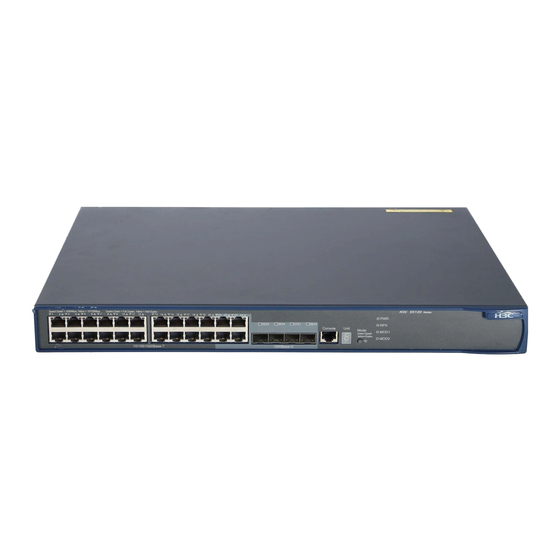- ページ 12
スイッチ HP 5120-48G-PoE+ EIのPDF 設定マニュアルをオンラインで閲覧またはダウンロードできます。HP 5120-48G-PoE+ EI 39 ページ。 Hp 5120 ei switch series
HP 5120-48G-PoE+ EI にも: データシート (17 ページ)

These MAD mechanisms identify each IRF fabric with a domain ID and an active ID (the member ID of
the master). If multiple active IDs are detected in a domain, MAD determines that an IRF collision or split
has occurred.
You can use at least one of these mechanisms in an IRF fabric, depending on your network topology. For
a comparison of these MAD mechanisms, see
Collision handling
When multiple identical active IRF fabrics are detected, MAD compares the member IDs of their masters.
If the master in one IRF fabric has the lowest member ID among all the masters, the members in the fabric
continue to operate in Active state and forward traffic. MAD sets all the other IRF fabrics in Recovery
(disabled) state and shuts down all their physical ports except the console ports, physical IRF ports, and
any ports you have specified with the mad exclude interface command.
Failure recovery
To merge two split IRF fabrics, first repair the failed IRF link and remove the IRF link failure.
If the IRF fabric in Recovery state fails before the failure is recovered, repair the failed IRF fabric and the
failed IRF link.
If the IRF fabric in Active state fails before the failure is recovered, first enable the IRF fabric in Recovery
state to take over the active IRF fabric and protect the services from being affected. After that, recover the
MAD failure.
LACP MAD
LACP MAD requires that every IRF member have a link with an intermediate device, and all these links
form a dynamic link aggregation group, as shown in
be an HP device that supports extended LACP for MAD.
The IRF member switches send extended LACPDUs with TLVs that convey the domain ID and the active ID
of the IRF fabric. The intermediate device transparently forwards the extended LACPDUs received from
one member switch to all the other member switches:
If the domain IDs and the active IDs in the extended LACPDUs sent by all the member devices are
•
the same, the IRF fabric is integrated.
If the extended LACPDUs convey the same domain ID but different active IDs, a split has occurred.
•
To handle this situation, LACP MAD sets the IRF fabric with higher active ID in Recovery state, and
shuts down all its physical ports but the console port, IRF ports, and any ports you have specified
with the mad exclude interface command. The IRF fabric with lower active ID is still in Active state
and forwards traffic.
"Configuring
MAD."
Figure
5. In addition, the intermediate device must
8
